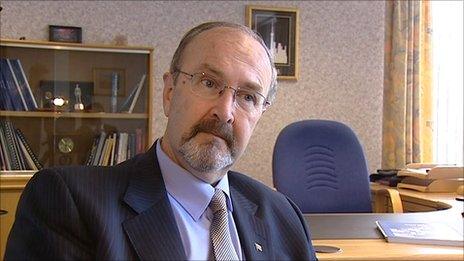NI's chief constable accused of obstructing Troubles' investigations
- Published
Michael Maguire is taking legal action in an attempt to force Mr Baggott to hand over sensitive intelligence material
NI's chief constable is being taken to court over claims he obstructed Police Ombudsman investigations into allegations against the police in 60 murders.
The action has been brought by NI's Police Ombudsman Michael Maguire.
He is attempting to force the chief constable to hand over sensitive intelligence material.
The PSNI said it believed it had responded appropriately to each request on a case-by-case basis.
Mr Maguire said he had no option because he had received more than 100 refusals for information.
He said the material was needed for his investigators to do their jobs.
This is an unprecedented legal action by the police ombudsman (PONI).
Mr Maguire claimed Chief Constable Matt Baggott was making it impossible to investigate allegations of serious criminal activity and misconduct.
"At this point in time, the police have refused us access to 100 pieces of information involving investigations surrounding in the region of 60 murders," he told the BBC.
'Complex investigations'
"I find that unacceptable and we have no other choice but to take legal action against the chief constable.
"We're talking about complex investigations into over 60 murders where there have been allegations of police criminality and misconduct in relation to their failure to investigate those murders; the fact that they may well have been protecting individuals involved in those murders.
"Answering those questions requires access to quite a range of intelligence and other sensitive material. I need access to that in order to be able to come to a view, in order to determine whether they are right or not."
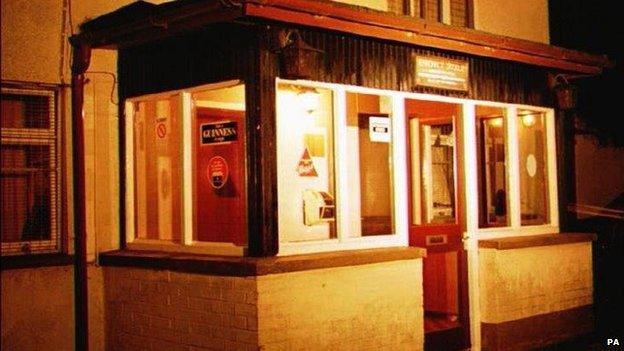
Six men were shot dead by the UVF at the Heights Bar in 1994
The ombudsman said the problem had emerged in recent months.
He launched the legal action against Mr Baggott after the Police Service of Northern Ireland (PSNI) failed to meet a deadline for handing over information requested.
The BBC understands that the investigations the chief constable is accused of obstructing include the murders of six Catholic men shot dead by the UVF as they watched a Republic of Ireland World Cup game in the Heights Bar in Loughinisland 20 years ago.
No-one has ever been convicted.
It has been claimed that the RUC, external did not conduct a proper investigation because they were protecting an informer, and that there was collusion between some police officers and the killers.
A report by the previous police ombudsman, Al Hutchinson, concluded that the RUC failed to properly investigate what happened at Loughinisland, but said there was insufficient evidence of collusion.
Those findings were quashed after a legal challenge by relatives of those who were killed.
Mr Maguire is now conducting a fresh investigation.
The chief constable stands accused of obstructing him by refusing to hand over intelligence material, including details about police informers that the ombudsman said was essential for him to do his job.
Mr Maguire said he was legally entitled to the information.
Access all areas
"The Police Ombudsman's office does not do investigations by negotiation," he said.

Constable Colleen McMurray was killed by an IRA mortar bomb in 1992
"This is fundamental to the independence of the office and the requirement for me to undertake a very clear and robust, independent investigation. In order to be able to do that, I need access to all areas of police activity to allow my investigators to come to a judgement about what happened.
"This gets to the core of independence, it gets to the core of accountability. We cannot have a situation where those who are the subject of investigation will determine what information is given to those who are undertaking that investigation."
It is understood other cases the chief constable is accused of blocking include incidents where police officers have been killed.
Colleen McMurray, external died and a colleague was seriously injured when their car was hit by a mortar in Newry, County Down, in March 1992.
It has been claimed that the RUC's Special Branch had advance warning about the attack, and that at least two IRA informers were involved.
Other cases are much more recent - and involve serious allegations against members of the PSNI.
"This is not just about the past, this is about a range of cases that both go before the Good Friday Agreement and come after the Good Friday Agreement, so it relates to the RUC and the PSNI," he explained.
"That's why it's extremely important in the context of an ombudsman's office which is there to provide an independent and robust investigation.
"I cannot allow a situation which is a challenge to the authority of the office, which is a challenge to the independence of that office, to allow that to happen."
In a statement, the PSNI said it was seeking to agree a solution with the ombudsman about what it called "complicated and, sometimes, competing legal issues".
"The PSNI has a legal responsibility for the care and management of all information that it holds - this is a responsibility which must be taken extremely seriously," the statement said.
"At the same time the PSNI also recognises the statutory responsibility to provide information to the Police Ombudsman, enabling exercise of his functions and legal responsibilities.
"We will continue to fulfil our legal obligations with the primary consideration being that of protecting life in accordance with Article 2 of the European Convention on Human Rights."
"PSNI will continue to work with PONI to seek to get an agreement over our respective obligations and ensure we both have shared understanding of the legal framework.
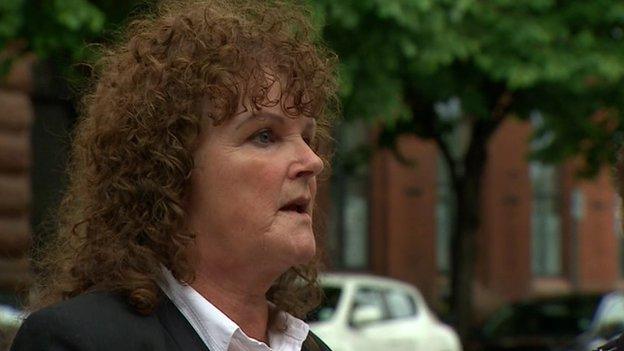
Collette Casey said the murder of her father, Tommy Casey, is among those being investigated
'Accountability'
The ombudsman is being represented by Sir Keir Starmer QC, the former director of public prosecutions for England and Wales, and a former human rights advisor to the policing board, which holds the PSNI to account.
The Policing Board said in a statement: "Police cooperation and the provision of information to the institutions with legislative responsibility for delivering independent oversight and accountability of the PSNI is critical.
"The application for leave for judicial review by the Police Ombudsman is very significant and a matter of great concern."
The daughter of Sinn Féin councillor Tommy Casey - who was murdered by UVF gunmen near Cookstown in 1990 - said her family wanted to see her father's killers brought to justice.
Collette Casey said the murder of her father "blew the family apart".
"Daddy's murder along with others are linked. We do have an idea who is behind it. We are very grateful to the ombudsman for trying to get the case investigated," she said.
"We are very shocked that the police are holding back on this.
"They are supposed to be the law and they are not helping him. His arm has been forced to take this to court to get information about daddy's murder and others."
Sinn Féin MLA Caitriona Ruane said the police's refusal to provide information to the ombudsman was "entirely unacceptable".
"This is affecting several key and high profile cases in which families such as those in Loughinisland are seeking the truth and it will damage overall confidence in the PSNI," she said.
"It is therefore not surprising that the ombudsman has been forced to take this action against Matt Baggott.
"We commend him for exhausting every avenue to conclude on these investigations despite the barriers being put in place and support victims and survivors and their families."
SDLP MP Margaret Ritchie said she supported the ombudsman's action, having worked to pursue the truth for the families killed in the Loughinisland shootings.
"Unfortunately, the Police Ombudsman's office has reached the point where they have to take this legal action in pursuit of the truth for the families and victims and to protect the independence and good name of their office," she said.
"This is due to the fact that the chief constable and senior officers have refused to cooperate with the Police Ombudsman's investigating officers.
"In so doing they are obfuscating this and other inquiries into historical cases thus preventing truth and justice for the families and the wider community. It is also quite clear that they are interfering with the independence of the Police Ombudsman."
The Committee for the Administration of Justice (CAJ) said it was shocked that the PSNI was refusing to share "sensitive intelligence".
CAJ director Brian Gormally said: "This action by the PSNI is on the face of it unlawful and is certainly wrong. It amounts to a subversion of the role of one of the most important policing accountability mechanisms that we have.
"We are deeply concerned that this is another example of an attempt to cover up past crimes. At a UK and local level, it appears that some politicians and elements of the security establishment are determined to maintain impunity for state agents.
"This is deeply offensive to the rule of law and undermines confidence in policing and all the institutions of state."
- Published5 December 2013

- Published23 January 2013
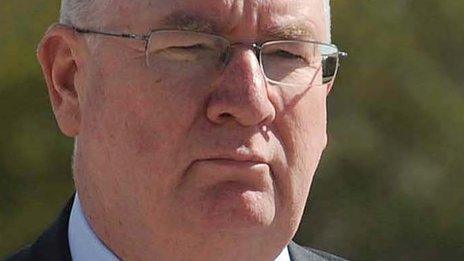
- Published23 January 2013
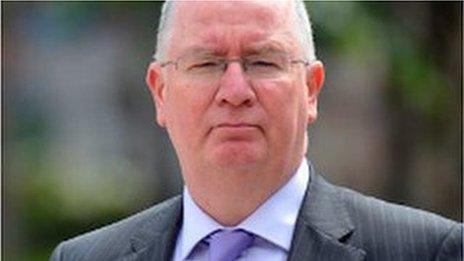
- Published17 July 2012

- Published8 September 2011
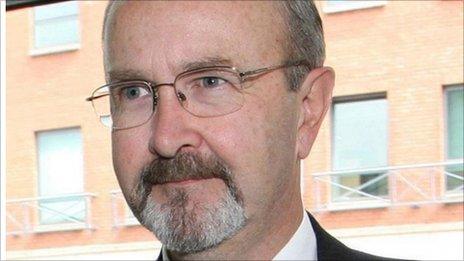
- Published5 September 2011
